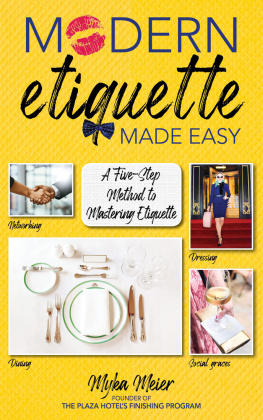This edition could not have come to be without the support and help of many polite people whose positive behavior has served as a beacon of civility, my family who know good manners is a journey and not necessarily a destination, my friends who bring me fabulous faux-pas examples from their personal and professional lives, and the thousands of people who have participated in my seminars, written to me via the Web, and engaged with me via social media.
INTRODUCTION
Have you ever noticed that there are some people to whom you take an instant liking? You enjoy speaking with them and look forward to seeing them again. Being with them actually makes you feel better about yourself. Conversely, there are those who make you feel uncomfortable whenever youre around them. While you may not be able to put your finger on the exact reason, as soon as you start talking to such a person, you wish that you were somewhere else. Often, these reactions are caused by the other individuals mastery of social guidelines.
Understanding how to behave in different situations is key to being a class act. The gracious woman is comfortable in a variety of environments and is able to make those around her comfortable as well. While it may seem as though she has some inherent capability for knowing exactly how to behave in different situations and how to interact with different individuals, this is not the case. In fact, the big secret is that people are not born with poise; it is actually a learned skill. And it is not a difficult one. While etiquette may seem like a daunting subject, its really quite simple, centering upon respect, consideration for others, and common sense. This means that with a bit of reading and a little practice, you too can know just what to say and do in all sorts of circumstances. You too can be a class act.
Becoming a class act is not only a relatively simple goal to achieve, but also an important one. Our abilities in a whole range of areas are generalized based upon the social behaviors we exhibit. Whether you are interviewing for a new job, building your business, or seeking new social relationships, manners matter.
This book contains a number of etiquette guidelines to help you navigate some of the most common interactions. Please note that I use the word guidelines deliberately. Contrary to popular belief, etiquette is not about rules. I never speak of etiquette in terms of rules because for every etiquette rule, I can think of an exception (or two or three). Guidelines allow for variation. Guidelines understand that behaviors are situationally specific. For instance, while you would of course use a fork and knife when dining out at a fancy restaurant, you wouldnt think twice about using your fingers when eating pizza with your family at home. It is important to understand not only what the etiquette guidelines are, but also when and how to apply them.
It is my hope that you will use this book in two ways. First, that you are enthralled enough to sit down with a refreshing drink and read it cover to cover. Second, that you will keep it on hand to refer to as etiquette issues arise. If you encounter etiquette emergencies outside of the topics covered in this book, please contact me via the Mannersmith website: www.mannersmith.com.
I hope you find this book both educational and entertaining.
CHAPTER ONE
PUBLIC PLACES and EVENTS
WHEN YOURE AT A PUBLIC VENUE whether its a place of entertainment or a place of worshipyour behavior affects others. Restaurants, the theater, the ballet, and sporting events are all places where we go to have a good time. But you need to make sure that your actions dont prevent others from having a good time, too. Similarly, in a house of worship, the way you act will affect others; in such a setting, it is important to show respect so as not to disturb those around you. Whats more, knowing the proper etiquette associated with specific types of public places will make you feel more at ease when youre out and about.
RESTAURANTS
RESERVE YOUR SPOT: If youre planning to dine outwhether with a romantic interest or a large gathering of friendsmake your reservation in advance. By doing so, youll avoid potentially long waits, which can become awkward when youre with a group or a date; plus, you dont want a bunch of hungry, cranky people on your hands. Some social media reservation sites will allow you to earn points toward priority seating or other dining perks when you make your reservations via the Web.
APPROPRIATE ATTIRE: Consider the formality of the establishment when deciding what to wear. A ball gown in a roadside seafood shack is bound to attract negative attention, and a tube top paired with short shorts is bound to be a showstopper (and thus an evening ender) in an upscale restaurant.
WHILE YOU WAIT: Some establishments have impeccable timing and will seat you at the precise time of your reservation. Others are sometimes unable to control all of the unpredictable variables. Picking a fight with the matre d is not a good way to set the tone for a night out and is certainly no guarantee of better service. Wait fifteen minutes before speaking with the person in charge, at which point you may politely ask how much longer it will be before your table is ready. If the matre d does not readily volunteer some compensation after a thirty minute wait, you may gently suggest that a complimentary offering might make your wait more pleasant. If the matre d is completely blas, you should think twice before going back.
WHERE TO WAIT: Often, the matre d will suggest that you wait at the bar until your table is ready. This is a smart move on the restaurants part, as it encourages you to spend more money. If you wish to wait at the bar, by all means, do so. If not, try to move aside so that you arent blocking the entrance.
BAR BASICS: If you decide to wait at the bar, you arent obligated to order a drink, though you may receive a number of looks from the bartenders, who count on tips for their income. If one person from your party orders a drink, everyone should. It is perfectly fine to order a soft drink. In finer establishments, if your table is called while you are still finishing your drink, a barkeep will collect your drinks and carry them to your table for you. In more casual places, you will be expected to carry your own drink. While bartenders usually prefer that you settle your tab before sitting down to dinner, you may ask the waitstaff to include your bar balance in the final bill for the meal.



















